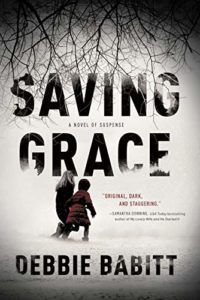An Interview with Debbie Babitt
 Debut novelist Debbie Babitt, part of the 2021 Debuts group, is thrilled to see her novel, Saving Grace, on the bookstore shelves. In fact, in a recent exchange via email, she wrote that she’d been “having a ball signing books all over. A dream come true!” That dream come true has garnered a lot of praise from both authors and critics alike. Author William Barnhardt says, “Once you start this book, you won’t want to stop,” and it’s been named one of the “Most Anticipated Thrillers of 2021” by both SheReads and A Book and A Dream. Readers are finding this book captivating, and that’s certainly something all authors long to hear. Like all the authors I interview, Debbie takes the craft of writing seriously, and finding time to answer an interviewers questions can be difficult. I’m grateful to her for making space in her day for me.
Debut novelist Debbie Babitt, part of the 2021 Debuts group, is thrilled to see her novel, Saving Grace, on the bookstore shelves. In fact, in a recent exchange via email, she wrote that she’d been “having a ball signing books all over. A dream come true!” That dream come true has garnered a lot of praise from both authors and critics alike. Author William Barnhardt says, “Once you start this book, you won’t want to stop,” and it’s been named one of the “Most Anticipated Thrillers of 2021” by both SheReads and A Book and A Dream. Readers are finding this book captivating, and that’s certainly something all authors long to hear. Like all the authors I interview, Debbie takes the craft of writing seriously, and finding time to answer an interviewers questions can be difficult. I’m grateful to her for making space in her day for me.
Christina: Saving Grace is your first novel, but you’re no stranger to writing, having written “Adventures in Copywriting” and served as a playwright and drama critic. What drew you to novel writing and psychological suspense in particular?
Debbie: I have always been an avid reader and mysteries and suspense have always been my favorite genres. I love solving mysteries/crimes. And as I grew older, I really loved psychological suspense. I love twists and especially reversals, when everything is turned on its head and everything you thought you knew is just the opposite. I love the idea and writing about nothing being what it appears. In terms of novels, in fact, the first thing I ever wrote was a 400-page novel when I was eight years old. About a young girl who goes to live with her aunt. Funny, in Saving Grace, my heroine, Mary Grace Dobbs, is orphaned at eleven and goes to live with her aunt and uncle. Prescient? Coming full circle? I loved writing plays as well as reviewing other people’s work. What I love about novels is you have a much broader canvas. It’s not just dialogue, which I love to write, but thoughts, perceptions, observations. I always say a first-person narrative is really a 400-page monologue!
Christina: Samantha Downing called Saving Grace “a big, southern gothic thriller packed with secrets.” How do you determine when to reveal the secrets and how much of the secret to reveal?
Debbie: That can be a challenge, especially in mysteries and thrillers! I tend to write organically, from character motivations, etc., and often, for me, things seem to fall into place. Then I go back and tweak, shade, revise if necessary. I also love that in suspense, when you learn a piece of information, which can be in some cases, merely a name, the next chapter takes that further. I guess it’s a matter of striking the right balance. You don’t want to reveal too much (too soon); but then, you don’t want twists, etc. to come seemingly out of left field. It’s a delicate balance!
Christina: The book is set in northwest Arkansas in a small town called Repentance. How did you choose that particular setting, and how important to the story is the setting? What surprised you about this setting?
Debbie: The setting is vitally important in Saving Grace. In fact, the town becomes a character in its own right. That’s why, while I based the town on a real town called Jasper, I decided to rename the town Repentance, which is the perfect reflection of this Southern Baptist town. I always start with voice; in this case an eleven-year-old orphan from the South. I knew she was southern because of the way she spoke. Then I just settled on Arkansas, Northwest Arkansas. The Ozarks, because another character really fit that bill. So it isn’t the deep South, but it’s far South enough. What surprised me? In my research, I realized that small rural towns like this still exist, almost in a time warp because of the massive role religion plays, in this case, the Baptist religion. I talked to a quite a few people from the South who said I nailed the South! Which was quite a thrill, as I have never set foot in the South (not farther south than Florida). Also a prestigious award group in North Carolina recently contacted my publisher to ask them to submit Saving Grace for nomination for Best Debut Novel Set in the American South (and the author doesn’t have to be from the South). That was quite an honor! Especially as Ron Rash will be the judge this year.
Christina: As you said, your stories always begin with a voice. How did you get into the head of an eleven-year-old girl to accurately capture her voice?
Debbie: It’s my acting background. As the great Russian director Constantin Stanislavski said, character is action. I always start with character; a voice starts talking to me and I have to listen! One of my favorite plays is Luigi Pirandello’s Six Characters in Search of An Author. It’s a tragedy, actually, but a play well worth reading! And in terms of accuracy, I hope I was able to authentically reflect the young Mary Grace. As the novel moves back and forth in time, I had to also capture the voice of the adult Mary Grace, who becomes sheriff of her town.
Christina: You rely on a recorder to help with your writing process and tend to write best in the morning. What about the recorder do you find so useful, and how did you first decide to use it? What about the morning calls to you?
Debbie: I used to write on a yellow pad or notebook with a Blue Berol bold liner pen. But it became too cumbersome, having to stop whatever I was doing, i.e., jumping off of a machine at the gym to jot down a thought or idea. This recorder was a blessing! It’s very small, and I speak into it and then input into the computer. But that isn’t the actual writing. I have to admit, it makes the creative process longer because other ideas come to me as I input and suddenly I have hundreds of pages. Then, when I sit down to actually write, other things start to happen! I liken this process to doing improvisations as an actor. It’s essential because it lets me know the boundaries (most of the time!) and how far I can go (and sometimes in the wrong direction!) but it all seems to work out in the end. As for writing in the morning, I have my best energy then. I am freshest. And I have recently changed my habits. I now go to bed earlier and rise earlier, so I have more hours to work in the a.m.! Also I force my mind onto my WIP when I go to sleep; that way, in the morning I wake up thinking about the story. It’s a discipline.
Christina: Are you willing to share a little bit about what you’re working on now?
Debbie: Sure. The new novel is called First Victim. It’s about a Manhattan Supreme Court judge who makes a shocking discovery during the course of a trial she’s presiding over. And the woods plays a large role in this novel, as well! I just sent the manuscript to my editor and am waiting on tenterhooks for her response!
Debbie can be found in multiple places!
Website: https://debbiebabitt.com/
Instagram: @debbiebabitt
Facebook: @debbie.babitt
Twitter: @DebbieBabitt
Thanks to Debbie for agreeing to this interview! If you know of an author who’d like to be featured in an interview (or you are an author who would like to be featured), feel free to leave a comment or email me via my contact page.

